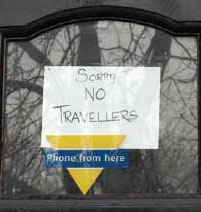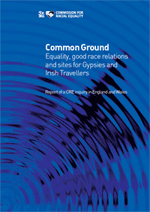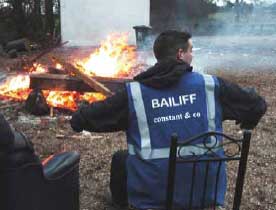
This page
- Why did the CRE carry out this inquiry?
- Key recommendations for local authorities
- Gypsies/Travellers in Scotland
Downloads
Download time approx. 11m 54s at 28 Kbps Download time approx. 5m 27s at 56 Kbps Download time approx. 2m 24s at 128 Kbps Download time approx. 1m 35s at 512 Kbps
Download time approx. 2m 34s at 28 Kbps Download time approx. 1m 47s at 56 Kbps Download time approx. 0m 21s at 128 Kbps Download time approx. 0m 5s at 512 Kbps
Download time approx. 6m 5s at 28 Kbps Download time approx. 3m 2s at 56 Kbps Download time approx. 1m 20s at 128 Kbps Download time approx. 0m 19s at 512 Kbps
Did you find this page useful?
Page information
This page was last updated on 30 June 2006

The CRE's inquiry into equality, race relations and sites for Gypsies and Irish Travellers
On 15 May 2006, the CRE published the findings of its inquiry into local authorities' race and community relations work around sites for Gypsies and Irish Travellers.
The issues analysed and addressed in this investigation are central to the CRE's twin mandates of equality and social cohesion. Our vision is of an integrated society in which all members of the public have equality of opportunity; can participate fully in all aspects of society; engage positively with one another; and have a shared sense of what it means to be a member of their local community, with the rights and responsibilities that this entails.
This inquiry report is based on survey responses from 236 local authorities across England and Wales, nine case study authorities and more than 400 responses to a public call for evidence. It provides the first authoritative evidence of how far local authorities are meeting their statutory duty to promote race equality and good race relations in their work on Gypsy sites. It also explores the policing of authorised and unauthorised sites, and the police's role in this.
"Rather than taking a long term view, they have an ad hoc, reactive approach, dealing with problems as they arise without looking at sustainable solutions that would benefit everyone. Many are failing to engage with the public, including Gypsies and Irish Travellers, about sites, and are doing nothing to build better community relations."
Sarah Spencer, former CRE commissioner, who led the inquiry
The evidence gathered during this inquiry has helped to establish where there are barriers to change, what good practice currently exists and what guidance is needed.
The report, Common Ground: Equality, good race relations and sites for Gypsies and Irish Travellers, a summary of its findings, and copies of the questionnaires sent to local authorities, are available to download below.

- Download the full report (pdf, 2.3Mb)
- Download the report summary (pdf, 323kb)
- Download the report summary in Welsh (pdf, 1.2Mb)
- Read the CRE's press release
- Questionnaire: Part 1: Race relations policy and practice (pdf, 112kb)
- Questionnaire: Part 2: Site provision and eviction (pdf, 95kb)
- Questionnaire: Part 3: Planning (pdf, 88kb)
Printed copies of the report and summary, along with an audio CD of the findings, are available here:
You can also download an audio version of the report as an mp3 file, or listen to it online:
Why did the CRE carry out this inquiry?
Relations between Gypsies and Irish Travellers and other members of the public are a particular cause for concern for the CRE.
People from these groups often lead separate, parallel lives. 'No Travellers' signs are widespread, media coverage tends to be hostile, proposals for authorised sites attract strong local opposition and the appearance of unauthorized encampments and developments causes considerable local tension.

Gypsies and Irish Travellers have the poorest life chances of any ethnic group today, for example:
- Life expectancy for men and women is ten years lower than the national average
- Gypsy and Irish Traveller mothers are 20 times more likely than mothers in the rest of the population to have experienced the death of a child
- Less than a quarter of Gypsy children achieved five GCSEs at A* to C grades in 2003, compared to a national average of just over half.
Part of the reason for this is the significant shortage of authorised transit and permanent sites available for Gypsies and Irish Travellers. The government estimates that between 2,500 and 4,000 more pitches will be needed by 2007.
Out of a total of nearly 14,500 caravans in England, around 3,600 are either on land not owned by Gypsies and Irish Travellers, or on land owned by them but developed without planning permission.
Another contributing factor identified by our research was that around half of the authorised sites were located in areas poorly suited to residential use, often close to motorways or major roads, rubbish tips, industrial activity or sewage works.
However, recent changes to planning and housing legislation offer local authorities a new opportunity to identify and provide sites in the same way as housing, reducing the need for unauthorised encampments and the community tensions they cause.
Key recommendations for local authorities
- Local authorities need to provide strong local leadership regarding Gypsy sites, and allocate responsibility at a senior officer level.
- Strategic and long-term approaches to enforcement and site provision should be developed as part of overall strategy on housing, linked to health, education and an overarching communications strategy.
- They should work proactively to promote good community relations and build integrated communities, and actively tackle mutual misunderstandings and stereotypes.
- Other local, regional and national bodies need to provide support and encouragement to help local authorities take this work forward.
"Local authorities can expect to come under intense public pressure to resist meeting their legal responsibilities... Our recommendations should help and encourage [them] to break out of the vicious circle they are trapped in, and to identify and provide sites as needed."
Trevor Phillips, CRE chair
The main recommendations for local authorities and other bodies are listed in the report and its summary; see above.
Gypsies/Travellers in Scotland
The CRE in Scotland recently launched its Gypsy/Traveller strategy for 2006/07. This which sets out the actions planned to counter discrimination and harassment experienced by Scottish Gypsies/Travellers.
In particular, the strategy identifies specific work relating to bringing about legislative change, clarifying the status of Scottish Gypsies/Travellers under the Race Relations Act, challenging racist reporting in the media and supporting community groups.
A copy of the strategy is available below:
